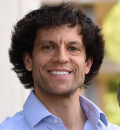
The School of Biological Sciences is one of six Schools of the University of Cambridge, each of which has a supervisory body, The Council of the School, comprising representatives of the constituent faculties and departments in each School.
The School of Biological Sciences is headed by Professor Jon Simons, supported by three Deputies in the key strategic areas of Research, Postgraduate education and Undergraduate teaching and by the Secretary of the School. The School is organised in nine Departments and four research institutes, with oversight of the Botanic Garden, the Herbarium and the Museum of Zoology.
Head of School
Professor Jon Simons
Head of the School of Biological Sciences
Jon is a Professor of Cognitive Neuroscience in the Department of Psychology, where he leads the Memory Laboratory.
Jon studied Psychology at the University of Aberdeen and undertook a PhD at the MRC Cognition and Brain Sciences Unit in Cambridge. Post-doctoral positions at Harvard and University College London were followed by a move back to Cambridge in 2006.
Jon’s research investigates the cognitive and brain mechanisms responsible for the subjective experience of remembering, and how we use mental experiences to make sense of the world. This work involves inter-relating cognitive hypotheses with evidence from functional neuroimaging of healthy volunteers, and examining the effects of neurological and psychiatric disorders on memory abilities, as well as the memory changes associated with normal aging.
As Head of School, Jon has responsibility for implementation of the School's academic vision surrounding research, undergraduate teaching and postgraduate education. He chairs the Council of the School and is a member of the University's senior leadership team and numerous University committees.
Deputy Heads of School
Professor Matthias Landgraf
Deputy Head of School for Postgraduate Strategy
Matthias is a Professor of Developmental Neurobiology in the Department of Zoology, where he also leads the Neural Network Development Group, funded by a Wellcome Trust Investigator Award.
Matthias studied Genetics at University College London and undertook his PhD at the University of Cambridge, later becoming a Royal Society University Research Fellow in the Department of Zoology.
Matthias’ research seeks to understand how neural networks are specified and assembled, using the locomotor network of the Drosophila (fruit fly) embryo and larva as an experimental model system. Using genetics, imaging, electrophysiology and behavioural analyses, his group has addressed fundamental questions on synapse development, dendritic growth and the regulation of plasticity. Most recently, Matthias’ team has begun investigating how transient embryonic experiences specify neuronal excitable and synaptic properties important for network stability; also shaping animal behaviour and resilience to challenges in later life.
Throughout his career, Matthias has been actively involved in postgraduate education, working with and teaching on PhD and MPhil programmes, as well as being Director and, more recently, Deputy Director of Postgraduate Education in the Department of Zoology. He is passionate about working with students and feels the best part of the job is witnessing them succeed.
Professor Rebecca Lawson
Acting Deputy Head of School for Research Strategy
Rebecca is a Professor of Neuroscience and Computational Psychiatry in the Department of Psychology where she leads the Prediction and Learning Lab. Her research focusses on understanding the neurobiological basis of how organisms process uncertainty, and how this impacts learning and decision-making. The aim of the lab is to understand how these fundamental mechanisms develop in early life and might underscore effective treatments for mental health conditions, such as anxiety and depression.
Dr Tim Weil
Deputy Head of School for Undergraduate Strategy
Tim is Associate Professor and Group Leader in the Department of Zoology.
Tim studied Biology at Washington University and later undertook a PhD at Princeton University studying the body axis formation in insects. After his PhD, Tim joined the Department of Biochemistry at the University of Oxford before moving to the Department of Zoology in Cambridge in 2013.
Tim’s research group studies how localised translation and egg activation are achieved, using Drosophila (known as the fruit fly) as a model system. Drosophila research has identified thousands of genes with human homologues and has provided key insights into developmental pathways, oncology, neurobiology and immunology.
In parallel with his research, Tim contributed to various Departmental and University-wide committees and initiatives, such as Deputy Head of Department (Teaching), Athena Swan committee, University Women in Science, Engineering and Technology Initiative (WiSETI) steering group and Fellow, Tutor and Director of Studies for Pembroke College.
Secretary of the School
Milly Bodfish
The School Secretary provides strategic leadership for all professional services staff in the School and its faculties and departments. The post holder reports to the Academic Secretary and to the Head of School.
Working closely with the Head of School, the School Secretary is responsible for helping to shape and implement the School’s academic strategy. Working with the Academic Secretary, and in consultation with the Head of School, the School Secretary is responsible for building effective partnership working arrangements with colleagues in professional services teams, ensuring that the services to academic institutions are efficient and effective.
The School Secretary manages the School-based professional services team and has professional management responsibility for the Departmental Administrators.
Milly has over 20 years of experience in Higher Education, working across the academic university at Cambridge, and also as REF Panel Adviser at the Higher Education Funding Council for England.






